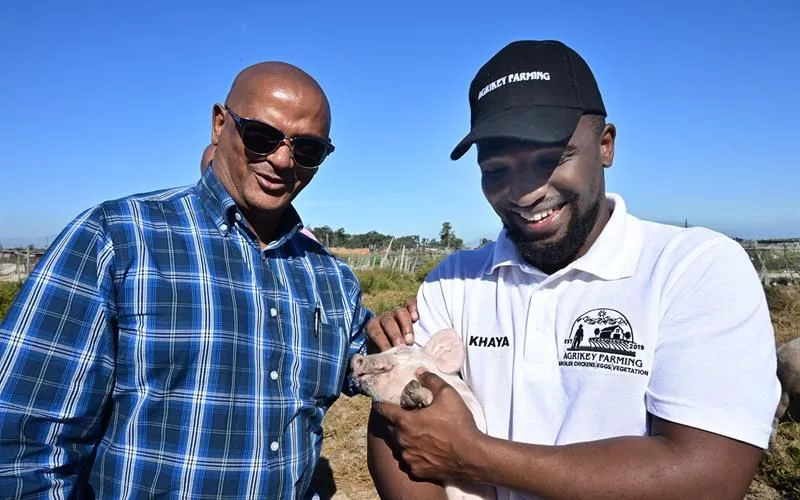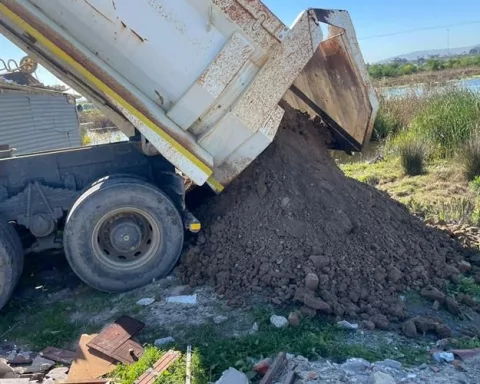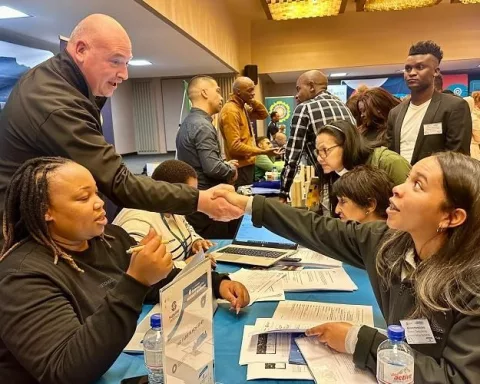The success of AgriKey Farming highlights the critical role of entrepreneurship training in catalyzing economic development and the transformative potential of connecting entrepreneurs with educational resources and support. AgriKey Farming in Mfuleni, South Africa started as a small chicken farming business but expanded into pig farming, crop cultivation, and vertical farming systems on school grounds to reinforce school feeding programs and create job opportunities. The owner, Khaya Burwana, also established five meat stands, providing fresh, locally-produced meat products and creating job opportunities.
AgriKey Farming diversified its operations from layer and broiler chicken farming to pig farming and crop cultivation, along with establishing vertical farming systems on school grounds. This not only reinforced school feeding programs but also created job opportunities, substantially boosting the local economy. AgriKey Farming’s success story highlights the critical role of entrepreneurship training in catalyzing economic development.
In the modest town of Mfuleni, Khaya Burwana embarked on his journey into agricultural entrepreneurship in 2021, laying the foundation of his small-scale farming business, AgriKey Farming (formerly Hatch of Oak). Initially, the venture concentrated on the layer and broiler chicken farming industry, selling eggs to the local market. However, a pivotal shift was about to occur in Burwana’s budding enterprise, driven by the Expanded Public Works Programme (EPWP) Entrepreneurship Training Programme, a plan executed by the City’s Urban Waste Management Directorate.
Diversifying Farming Business
Under Burwana’s leadership, AgriKey Farming has undergone an impressive transformation, diversifying its operations extensively. Burwana extended the scope of his business, incorporating pig farming and crop cultivation, successfully navigating his venture into uncharted territories. The proactive business owner did not confine his growth to conventional farming fields, but instead sought harmony through cooperation, joining forces with five local schools and another entrepreneur.
This partnership led to the inception of vertical farming systems on school grounds, where a substantial 40% of the produce reinforces school feeding programs. Moreover, this project exposes students to the realm of farming, imparting them with valuable skills they can use throughout their lives.
Impact on Local Community and Economy
The business expansion of AgriKey Farming also influenced the local community’s meat market. Burwana established five barbeque meat stands, transforming them into popular local centers for fresh, locally-produced meat products. Alongside the expansion came job opportunities for 10 individuals, substantially boosting the local economy. But Burwana’s aspirations reach further – he aims to set up a compliant slaughterhouse to maintain high meat production and distribution standards for local stores.
The Power of Education and Mentorship
The entrepreneurial journey of Burwana symbolizes the transformative potential of connecting driven entrepreneurs with educational resources and support. Alderman Grant Twigg, Mayoral Committee Member for Urban Waste Management, highlighted that entrepreneurs often possess the capacity for growth but need mentorship and training to gain the confidence to take expansion risks.
Now in its third year, the EPWP Entrepreneurship Training Programme, managed by the University of the Western Cape, delivers essential skills to entrepreneurs through training modules covering financial management, marketing, leadership, and more. The program includes personalized coaching and mentorship, promoting job creation and revenue growth among participating businesses.
The Success Story of AgriKey Farming
In the context of urban waste management and sustainable agriculture, AgriKey Farming’s success story offers a glimmer of hope and proves the power of effective education and mentorship. This narrative of evolution, growth, and accomplishment highlights the critical role of these initiatives in fostering entrepreneurship and catalyzing economic development.
The Urban Waste Management Directorate’s investment in entrepreneurship training of the City has reaped benefits in the form of AgriKey Farming’s progress. It exemplifies how public works programs can indeed stimulate economic expansion and cultivate entrepreneurial spirit. As Burwana expressed his gratitude towards the City of Cape Town, he emphasized that he is not just a recipient but also a proud contributor to the program’s legacy.
The Future of AgriKey Farming
The chapter on AgriKey Farming is still being written. With its forward-thinking founder at the steering wheel and the city’s backing, the future of this small-scale farming business shines brightly, overflowing with possibilities.
What is AgriKey Farming?
AgriKey Farming is a small-scale farming business in Mfuleni, South Africa that started as a chicken farming business but expanded into pig farming, crop cultivation, and vertical farming systems on school grounds to reinforce school feeding programs and create job opportunities.
How did AgriKey Farming diversify its operations?
Under Khaya Burwana’s leadership, AgriKey Farming diversified its operations extensively by incorporating pig farming and crop cultivation, along with establishing vertical farming systems on school grounds.
What impact did AgriKey Farming have on the local community and economy?
AgriKey Farming established five barbeque meat stands, transforming them into popular local centers for fresh, locally-produced meat products. Alongside the expansion came job opportunities for 10 individuals, substantially boosting the local economy.
What is the EPWP Entrepreneurship Training Programme?
The EPWP Entrepreneurship Training Programme is a plan executed by the City’s Urban Waste Management Directorate that delivers essential skills to entrepreneurs through training modules covering financial management, marketing, leadership, and more. The program includes personalized coaching and mentorship, promoting job creation and revenue growth among participating businesses.
How did education and mentorship contribute to AgriKey Farming’s success?
The entrepreneurial journey of Khaya Burwana symbolizes the transformative potential of connecting driven entrepreneurs with educational resources and support. The EPWP Entrepreneurship Training Programme delivers essential skills to entrepreneurs through training modules and personalized coaching and mentorship, promoting job creation and revenue growth among participating businesses.
What is the future of AgriKey Farming?
With its forward-thinking founder at the steering wheel and the city’s backing, the future of AgriKey Farming shines brightly, overflowing with possibilities. Khaya Burwana aims to set up a compliant slaughterhouse to maintain high meat production and distribution standards for local stores.












